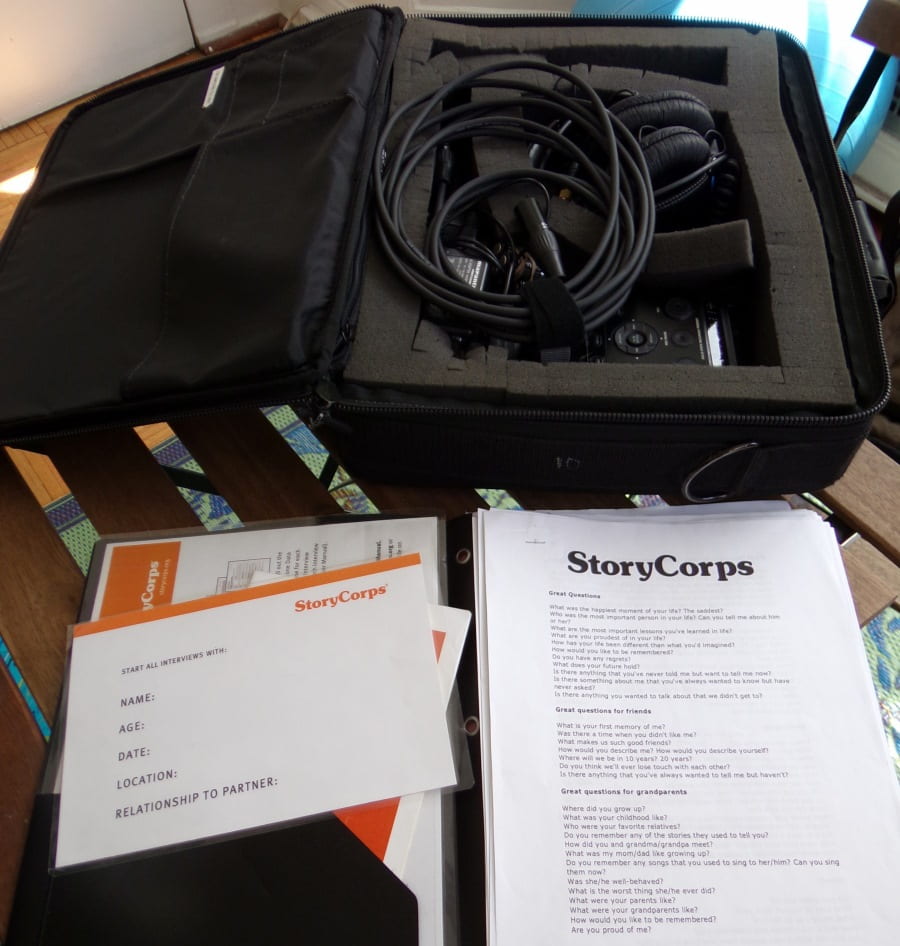Wednesday’s Agenda:
1. Icebreaker: “Did you ever…?” Speed dating style!
2. Revisiting the question game with Baba Griot’s poetry
3. Autobiographical Sketch Exercise
4. Practice Interview 1
On the third day, our Interviewers-in-training arrived at the Atlas Center with a few more friends in tow. All were ready to get started, and we began our Wednesday afternoon with a “Did you ever…?” icebreaker. Young and older adult participants sat across from one another and told stories based on slips of paper that asked “Did you ever have a pet?” or “Did you ever make something that you were really proud of?” With a total of 22 people participating, the laughter and memories were flowing all around our long table.

After exercising our minds and memories, we shirted our focus back to the Question Game from yesterday. Baba Griot volunteered to bring in his poetry and share his experiences as a published author. Insightful, open-ended questions were posed by everyone around the circle, and we even had the opportunity to watch Baba Griot perform his poem, “John Coltrane.” You can read more of Baba Griot’s poetry on the Atlas Senior Center’s website here.

As a group, we discussed why certain questions “won” a point and others did not. Our Interviewers, still in training but coming along quickly, described ideal questions to ask as open-ended, asking for more detail, and asking for examples. I followed up their astute observations by discussing the three levels of inquiry, role of follow-up questions, and the idea that questions should lead to stories and not just answers
To delve further into our own personal histories, everyone wrote a brief autobiographical sketch of no more than a paragraph.

Next, young and older adult partners practiced interviewing one another for 10 minutes each. This exercise was meant to introduce the interviewing format, and I could tell that pairs were doing more exchanging than interviewing. Tomorrow, we will focus on the difference between an exchange and an oral history interview and will ask the Interviewers to push themselves in this new skillset.

Thursday’s Agenda:
1. Opening Activity: Word Puzzles and Knot Ties
2. Interview Preparation Discussion
3. Practice Interview #2 with Audio Recorders
4. Debrief Interviews
5. Closing: StoryCorps Podcast and Preview of Next Week’s Agenda!
Prior to meeting with the participants in Generations of Us, I visited the StoryCorps booth at the Chicago Cultural Center downtown to pick up a StoryKit. I contacted the StoryCorps Chicago booth in July to see if there was any potential for collaboration, especially in preserving the stories captured during this project. I was incredibly excited to speak with Shirley Alfaro of StoryCorps, who suggested that I borrow a StoryKit, which contains a portable audio recorder and microphone, and which allows stories to be recorded with greater quality and be preserved in the Library of Congress. Interviewers and narrators can even give StoryCorps permission to produce and possibly air their stories on local or national radio! I have listened to the StoryCorps podcasts for many years—I especially love the animations online—and am very energized that I can incorporate this resource into Generations of Us. For more on StoryCorps in Chicago, visit http://storycorps.org/chicago/.
This is the StoryKit:

Our agenda today focused on doing final preparations before we record final interviews next week. We reviewed several portions of the Oral History Guide that I created and discussed important tips, like gather basic biographical information about your interviewee first, do background research, set personal and project goals, and practice your questions. The young adults from the South Side Help Center were relieved to hear that oral history interviews are relaxed and flexible so that stories and experiences can be told naturally. We also discussed the nature of historical preservation and the difference between primary and secondary sources. I emphasized that they are creating primary source materials that can be used by historians now and in the future. I observed that both young and older adults were excited to play a role in creating history and not just reading a textbook! Sitting in a circle, I posed a potential focus for an oral history interview: the 1968 Chicago riots. From there, the older and young adults discussed race, violence, and the police, drawing parallels between the past and present state of racial and community violence in Chicago. Afterwards, a young adult approached me and said, “can we do that again?” I responded, “Yes, and you can record that conversation!”
After our snack break, we broke into groups to practice interviews with the audio recorders. I gave a brief lesson on how to use our handheld Sony audio recorders and let them run with it! Here are some pictures of the practice interviews from today:

To close up the week, I decided to share a StoryCorps podcast episode that aired in early July 2014, where a father and son discuss their experiences as firefighters in Chicago. You can listen to that episode here. Again sitting in a circle, I told the group how they will have the opportunity to record their stories and possibly give them to StoryCorps. Most had not heard of StoryCorps, but after hearing the podcast episode, everyone clapped, and I think they will now be fans.
Though it was 4:03pm, and the young adults bus was waiting for them in the parking lot, one young adult was raising her hand to speak. I called on her, and she said so eloquently, “I am just so excited for this because we can actually learn about history by connecting to someone who was there. It is so much more real!” This was the perfect way to end week one and validated the entire premise of intergenerational work and oral history—as well as all of the hard work that everyone has done to make this project possible!